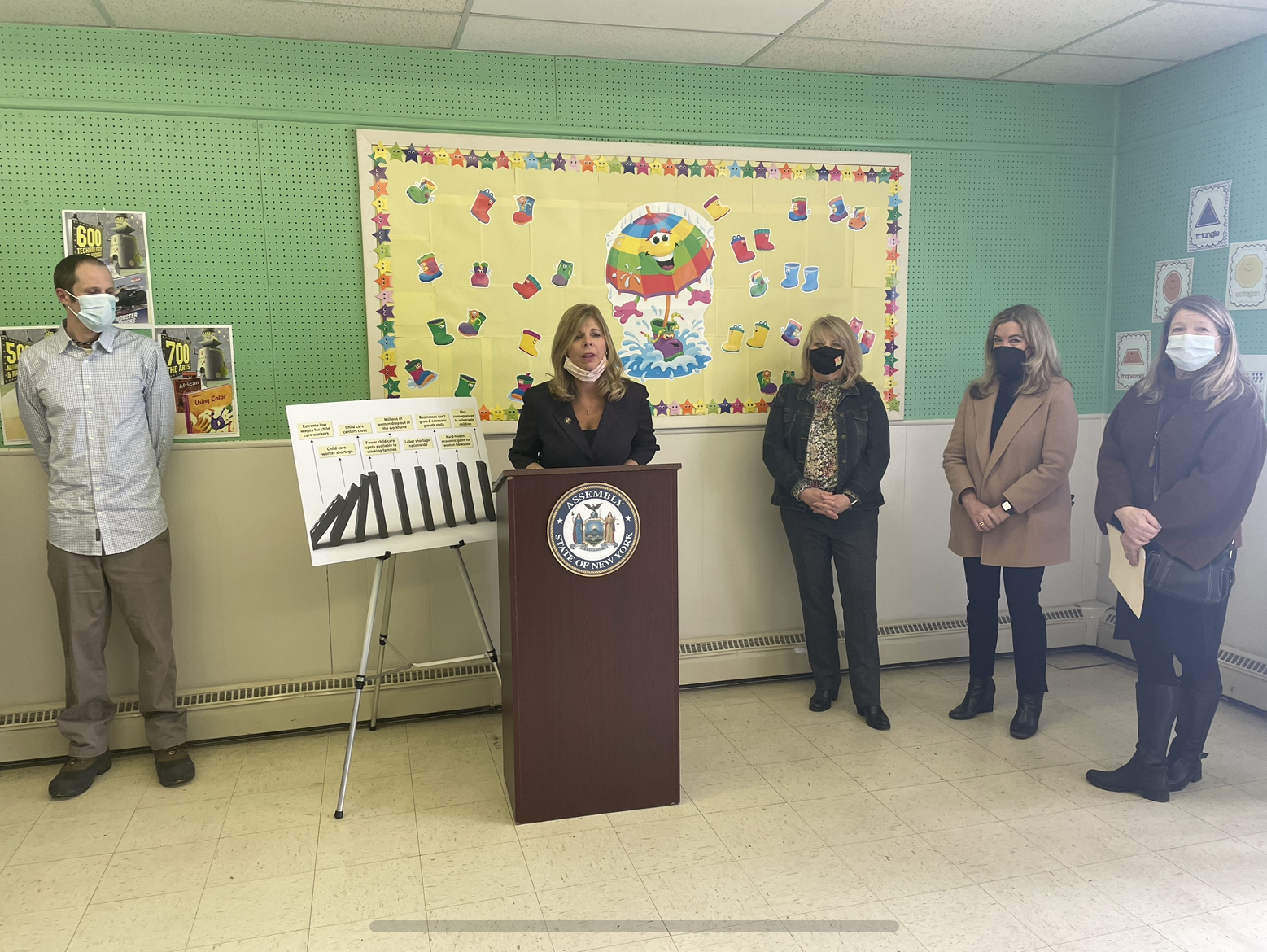Assemblymember Wallace Joins State, Local Officials to Call on New York to Fully Fund ‘True Cost of Child Care’ in Erie County
Assemblymembers Wallace, McMahon, Conrad, Deputy County Executive Whyte urge state to invest $46 million in childcare, as recommended in recent report by Buffalo Cornell Co-Lab
Today, Assemblymember Monica P. Wallace (D-Lancaster) joined with Assemblymembers Karen M. McMahon (D-Amherst) and Bill Conrad (D-Tonawanda), Deputy County Executive Maria Whyte, the Buffalo Co-Lab of the Cornell University School of Industrial and Labor Relations, and advocates for women and small businesses to call on Governor Hochul and the state Legislature to fully fund the true cost of child care in Erie County.By increasing its investment in childcare in Erie County by $19.6 million, New York State would allow childcare providers to expand, better serve local children, and raise wages for thousands of underpaid childcare workers.
Childcare providers and advocates have long said that the current subsidy rates for children of low-income households do not cover the true costs of providing care. A recent report, The True Cost of Child Care, by Erie County and the Buffalo Co-Lab confirmed this trend. According to that report, current subsidy rates from Erie County and New York State fail to cover childcare costs incurred by providers due to subsidy rates being too low. The inadequate subsidy rates prevent centers from attracting and retaining qualified employees.
“We are facing a crisis of unaffordable and inaccessible childcare in our community, which is worsening the labor shortage and burdening working families, primarily women,” said Assemblymember Wallace. “In order to continue our economic recovery and continue progress on women’s participation in the workforce, it’s absolutely vital that Governor Hochul and the Legislature fully fund the true cost of childcare in Erie County. In doing so, we will alleviate the hiring crunch, help working families get ahead, help providers improve care in their facilities, and immediately raise the living standards of thousands of hardworking but underpaid childcare employees.”
The report found that 75 percent of childcare workers are paid less than $15 per hour, which is considered the lowest living wage for a single adult in Western New York. As a result of these unsustainable wages and lack of benefits, one out of every nine local childcare workers in Erie County have left the industry between 2019 and 2020. Further, because most childcare workers are women and people of color, the subminimum wage exacerbates existing wage inequality.
If New York State increased Erie County’s Child Care Block Grant to $46 million, providers would generate enough revenue to pay childcare workers $20-$25 starting hourly wages. As a result, providers would be able to attract more workers, reduce waiting lists, and expand to serve more children.
“Our collaborative study found that many childcare providers cannot accept more children in their programs because they don’t have the staff – which means long wait lists and unmet care needs. Without additional funding, the odds of raising wages and attracting more qualified workers to meet Erie County’s care needs are slim and long. Greater public funding for quality child care is a necessary investment into a better functioning, more equitable, and democratic economy,” said Dr. Russell Weaver, director of research for the Buffalo Co-Lab of the Cornell ILR. “The Cornell University ILR School is grateful to our state and local representatives for their leadership on this important issue, which affects so many households.”
“Erie County came to caregivers’ aid by using U.S. CARES Act funding to support child care providers during the COVID-19 pandemic, allocating millions in grant funding to directly support child care providers and adding additional funding to replenish and expand the child care subsidy to include families earning up to 85% of the NYS median income. We provided a critical lifeline to our community then and we are urging NYS to continue that work now,” said Deputy County Executive Whyte. “The crisis in childcare is real, and we need changes to the childcare system statewide to better care for our children and to close the gap between the childcare market rate and the actual cost of care. I thank Assemblymember Wallace for her focus on this issue and for working to help caregivers in Erie County and across New York State.”
“The Buffalo Niagara Partnership acutely understands that access to affordable, reliable, and high-quality childcare is directly related to our region’s ability to tackle our ongoing workforce challenges,” said Dottie Gallagher, President and CEO of the Buffalo Niagara Partnership. “BNP members cite the lack of qualified talent as their number one inhibitor to growth.Too much talent is currently sidelined because of a lack of viable childcare options for families, preventing parents from entering or remaining in the workforce.Increased funding from New York State will ensure more families can access affordable, reliable, and high-quality childcare.”
“According to the report by the Buffalo Co-Lab, there is a significant gap between the amount of the childcare subsidy paid to the provider and the actual cost of the care they provide. This gap results in a financial loss to childcare providers and an inability to pay competitive wages to the childcare workforce,” said Assemblymember McMahon. “The cause and effect is clear: low wages for childcare workers leads to worker shortages, which lead to the closure of facilities, which puts stress on the labor force as a whole. I’m proud to stand with my colleagues, Assemblymembers Wallace and Conrad, and Deputy County Executive Whyte in calling on the Legislature and the Governor to support childcare workers in order to keep this industry viable and our local economy growing.”
"This pandemic only exposed and amplified a crisis that has long been leaving parents with an impossible choice: to work to support their children, or to sacrifice income to care for their children,” said Assemblymember Conrad. “We know from precedents set by governments around the world that subsidized childcarecould restore our workforce, bolster the economy and afford more citizens – women especially – opportunities for upward mobility. Quality childcare also improves outcomes for kids in school, and well into adulthood. It's simply a common-sense move, to make astatewide commitment to the expansion of accessible childcare – and there hasnever been a bigger need for it than right now."

